
The ingrailed clay is a moth of the family Noctuidae. The species was first described by Johan Christian Fabricius in 1775. It is distributed through most of Europe and the Palearctic.

The small square-spot is a moth of the family Noctuidae. The species was first described by Karl Friedrich Vieweg in 1790. It is found in Europe apart from the far south-east then east through the Caucasus, Transcaucasia, Central Asia, Siberia, the Russian Far East and Kamchatka.

Hypena is a genus of moths in the family Erebidae. It was first described by Franz von Paula Schrank in 1802. These non-migratory moths overwinter as pupae and almost never estivate as adults.
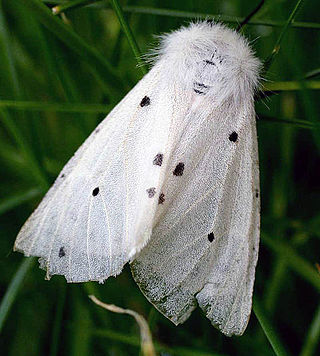
Diaphora mendica, the muslin moth, is a moth of the family Erebidae. It is found in the Palearctic realm east to Lake Baikal.

Lerina is a monotypic moth genus in the family Erebidae. Its only species, Lerina incarnata, the crimson-bodied lichen moth, is found in Mexico and southern Arizona. Both the genus and species were first described by Francis Walker in 1854.
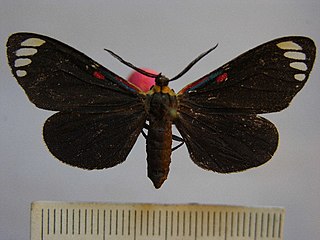
Phaloesia is a monotypic of tiger moth genus in the family Erebidae. Its only species is Phaloesia saucia, the saucy beauty moth. The genus and species were first described by Francis Walker in 1854. It is found from the lower Rio Grande Valley of Texas in the United States to Venezuela.
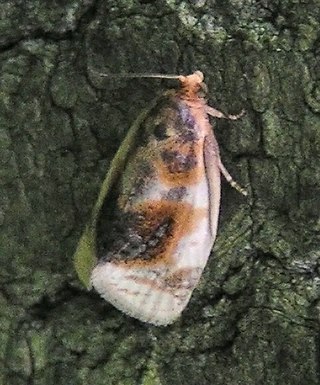
Clepsis melaleucana, the black-patched clepsis, is a moth of the family Tortricidae. The species was first described by Francis Walker in 1863. It is found in North America from Alberta to Newfoundland, south to North Carolina and Missouri.

Zanclognatha is a genus of litter moths of the family Erebidae. The genus was erected by Julius Lederer in 1857.
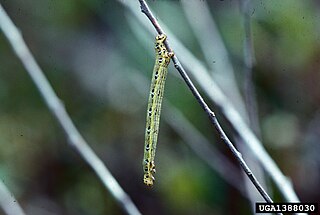
Cingilia is a monotypic moth genus in the family Geometridae erected by Francis Walker in 1862. Its only species, Cingilia catenaria, the chain-dotted geometer, chain dot geometer, chainspotted geometer or chain-spotted geometer, was first described by Dru Drury in 1773. It is found in North America from Nova Scotia south to Maryland and west to Kansas and Alberta.

Eubaphe is a genus of moths in the family Geometridae erected by Jacob Hübner in 1823.
Drasteria petricola, the little arches, is a moth of the family Erebidae. The species was first described by Francis Walker in 1858. It is found in western North America from Yukon and the Northwest Territories south to New Mexico in the Rocky Mountains, east to Manitoba.
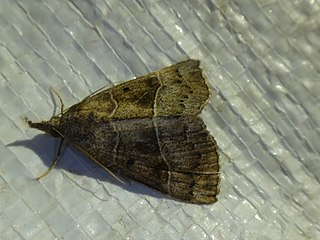
Hypena deceptalis, the deceptive hypena or deceptive bomolocha moth, is a moth of the family Erebidae. The species was first described by Francis Walker in 1859. It is found in North America from Manitoba to Quebec, south to Florida and Texas. It is absent from much of Gulf Coastal Plain though.

Venusia comptaria, the brown-shaded carpet moth, is a moth in the family Geometridae. The species was first described by Francis Walker in 1860. It is found in eastern North America, from Florida to Newfoundland, west to Manitoba. The habitat consists of woodlands.

Eudulophasia invaria is a species of moth in the family Geometridae first described by Francis Walker in 1854.
Steniodes mendica is a moth in the family Crambidae. It was described by W. von Hedemann in 1894. It is found in Cuba, Jamaica, Puerto Rico, the Virgin Islands and Grenada, Costa Rica, Honduras, Mexico and the United States, where it has been recorded from Florida to Texas.
Eubaphe meridiana is a moth in the family Geometridae. It was first described by Annie Trumbull Slosson in 1889. It is found in the eastern United States. The species is listed as endangered in the US state of Connecticut.
Eubaphe helveta is a species of moth in the family Geometridae first described by William Barnes in 1907. It is found in North America.

Eubaphe unicolor is a species of geometrid moth in the family Geometridae. It is found throughout North America to South America.
Eubaphe medea is a species of geometrid moth in the family Geometridae. It is found in Central America and North America.

Margaroniini is a tribe of the species-rich subfamily Spilomelinae in the pyraloid moth family Crambidae. The tribe was erected by Charles Swinhoe and Everard Charles Cotes in 1889, originally as family Margaronidae.















